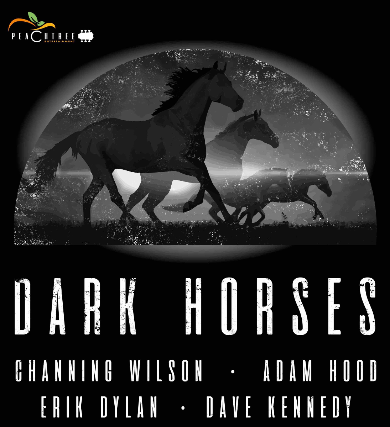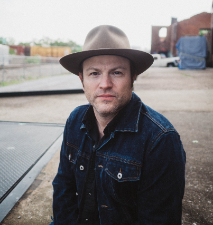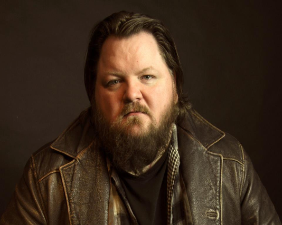
RESERVED SECTION: Included seating at high top table with cocktail service. You must purchase 4 seats.
SEATED SECTION: First come seated chairs in the middle of the room.
GENERAL SECTION: Standing room only in the back of the room.

With a John Denver grin and mind full of Alabama attitude, Adam Hood knows the beautiful mess of blue-collar love and everyone on Music Row wants in. Tracks from his critically acclaimed 2011 album The Shape of Things have been cut by Little Big Town, David Nail, Josh Abbott Band, Brian Keane and John Corbett. The legendary Willie Nelson and Leon Russell have each picked Hood for respective national tours.
Free from his contract with Carnival Music, Hood is taking advantage of his newfound independence with his rough and wild fourth studio album Welcome to the Big World. With producer Rachel Loy at the helm, the 11-track collection is a biographical masterpiece that ranges from Delbert McClinton roadhouse rock to Kris Kristofferson storyteller folk, with a mix of timeless two-step shuffles.
Welcome to the Big World kicks off with the split-tempo barnburner “Don’t That Sound Like Love,” which celebrates the sacrifices of love on a budget accented with Freddie King blues guitar and piano riffs in Russell style. A Top 5 hit on both Texas Music Charts, lead single “Trying to Write a Love Song” is a straightforward, booze- and truck-free anthem about chasing a woman in a hot dress to cure writer’s block.
Moving his beloved daughter three times before the age of 15 provided framework for the striking title track, a coming of age two-step that serves as a roadmap in major life changes.
With lyrics, “Welcome to the big world / Welcome to your age / Where everybody says, ‘No one said this was easy.’ / Baby, it’s a big world / A revolution everyday / But you can’t see what I can / The whole thing’s in your hands,” Hood suggests the key to surviving life’s struggles is positive independent thought.
“It’s the heart of the collection,” Hood says. “I’m learning to live with my abilities and be content with my place in life. Those are grownup things to deal with, but in the big world, it’s something we all have to do.”
Grammy-nominated hit-maker Will Hoge co-wrote the imagery-ridden “Postcards and Payphones,” a rambling ballad that describes the pain and loneliness of touring life. Charlie Worsham co-wrote the fun-loving “Countriest,” which stars Texas darling Sunny Sweeney in her guest harmony debut. A live and rowdy crowd at Billy’s Icehouse in New Braunfels, Texas backs Hood on the raucous “Bar Band.”
Classic “missing you” themes are tackled on the shuffle “Whole Lot of Hard Work,” the Creole accordion-anchored “Stars Around a Cajun Moon” and the heartache-driven “Way Too Long.”
“He Did” is a tribute to his late father Larry Hood, a second generation timber man who lost his battle with colon cancer in 2010. The acoustic tearjerker celebrates inherited habits, both the good and the bad. Closer “I Took a Train” is a salute to one of Hood’s top musical heroes John Prine.
When he’s not making music in Nashville or building his loyal following in Texas, across the Southeast and beyond, Hood can be found in at home in Northport, Alabama where he raises a family and keeps a healthy garden of homegrown vegetables. “I’ve been blessed to have my name listed among my friends’ and heroes’ albums, but nobody’s going to deliver my music like I do,” Hood says with confidence. “These songs probably wouldn’t be suited for anyone else but me. I’m so thankful I still have the desire to write them and get them out there to whomever will listen.”

"God could you throw this dog a bone. Let me turn the corner and be home. I'm tired of being on this road alone." Real lyrics are what Channing Wilson is all about.
From a small town in Northwest Georgia, Channing learned about real life American good times and hardships. He's not afraid to tell you about it either. From his songs like "Poor Man's Cocaine" referring to methamphetamines taking over rural America, to songs like "Crazy Over You" which is a throwback love song to the era of Waylon Jennings and Merle Haggard, Channing's voice along with his lyrics stand alone in a time of mass produced "throwaway" singers and songwriters.
Brought up on the real side of the tracks by two hard working "dirt collar" parents, he had plenty of opportunities to learn real life at an early age. Channing says "I didn't have a musical family. My mother is a pretty good singer, but an even better worker. So, I found music later than most artists." Finding music later for Channing didn't slow down his passion for it. Learning guitar at 17 and starting writing shortly after. "I came across a book of short poems my mother had written before I was born, and after reading them I was so inspired to explore my own creative side."
By age 25, he had flunked out of college and quit more jobs than he applied for. "I never could accept the idea that I was supposed to work every day for someone else. I expected more than a paycheck. After a friend turned me on to Guy Clark and Steve Earle, I knew 2 things. I never wanted to punch a clock again, and I had to become a better writer and musician." That's exactly what he did at 26 years old, he started his first band and quickly learned the ropes as a very successful regional act. That venture lasted 6 years until he became a father and knew he had to step up his game if he was going to turn a dream into a way of life.
Selling a fishing boat and a decent guitar collection to finance trips from north Georgia to Nashville every week paid off in October of 2010 he was approached by EMI Music Publishing after playing a Tuesday night showcase called Alabama Line. After meeting with EMI a few times he was offered his first publishing deal. "I didn't know what I had to offer such a big corporate publishing company, but when I looked on the roster and saw Guy Clark I knew I was in." It didn't take long before he was in the room with his teacher. Learning from the master himself. "Just knowing Guy has made me a better man, but getting to share ideas and stories is a dream come true."
Channing got his first cut with a song titled "Living With The Blues." Sony recording artist Tyler Farr cut the song the same way he heard the demo. Acoustic and raw. Channing even played the guitar track on Tyler's upcoming album. He has been writing with some of Nashville's best writers such as Guy Clark, Ashley Monroe, Drake White, Dave Kennedy and more. All the while pursuing artist acknowledgment. When asked if he wanted to be an artist he replied "If you can't tell I'm an artist by listening to my songs, you're not listening."
He has shared bills with so many of his heroes such as Billy Joe Shaver, Steve Earle, Robert Earl Keen, Tony Joe White, Chris Knight, Dale Watson, and many more including getting invited to be on the 2012 Country Throwdown Tour.
Channing's love for country music history and the future of country music is second to none. "I came to Nashville to make a difference and I'll always work hard to earn respect from my peers. I owe them that at least. Hell, I've played their songs so many times for free."


After years of paying dues everywhere from dives to theaters, Dave Kennedy has descended on Nashville like whirlwind. With a voice big enough to grab your attention and songs great enough to hold it, the singer-songwriter and East Tennessee native has spent years developing his craft both as a performer and prolific writer all around the Southeast, and is determined to take his place among the new wave of Americana and more traditional country music artists. His songs are equal parts heartbreak, redemption, whiskey and truth, which is why he’s quickly becoming a favorite of music fans, songwriters, and artists alike. Dave has spent the last 7 years tirelessly playing and writing in search of the voice and statement he wants to bring to the music he loves. With ear and heart ever faithful to the country traditions and journeys of those who came before him, his ability to connect with an audience through both his words and performance is a testament to both his traditional roots and his soulful voice, which resonates with or without a microphone.
